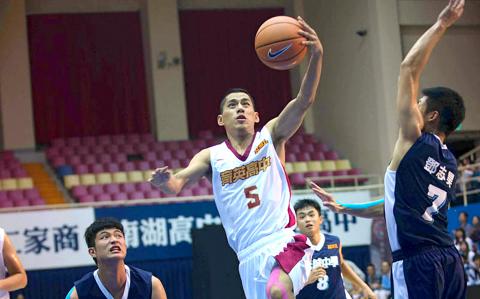While there’s no shortage of seize-your-youth, go-for-your-dreams motivational films featuring talented teenagers in Taiwan’s cinema scene, most of them try too hard and end up with ridiculously trite dialogue, over-the-top sappy scenes and an implausible script with plot holes the size of the Pacific Ocean.
It’s even harder not to fall into cliches when the featured sport is the hugely-popular basketball — especially when pretty much every variation has been made already in the past decade. What more can possibly be done after 2008’s Kung Fu Dunk (功夫灌籃)? Dunking aliens? Wait, Hollywood already did that with Space Jam.
But while We Are Champions (下半場) doesn’t deviate much from the standard high school sports flick formula, somehow it works. First of all, the plot is solid and covers its bases instead of running amok with the emotional material, and the actors deliver heartfelt, believable lines that stop short of being cringe-worthy.

Photo Courtesy of atmovies.com
The action is also handled well, edited in a style that’s realistic yet exciting, making the audience feel that they’re on the court rather than the stands. While it’s a treat for basketball fans, one doesn’t necessarily need to understand the sport to enjoy this film. What carries the story is the poignant and often contentious relationship between two talented brothers from a struggling family, Hsiu-yu (Fandy Fan, 范少勳) and Tong-hao (Berant Chu, 朱軒洋), who end up squaring off against each other on rival teams.
Indeed, believability is what director Chang Jung-chi (張榮吉) was aiming for when he began production, telling the media that this film would be nothing like Kung Fu Dunk. Although Chang has been producing feature films for years, he first made a name for himself by co-directing the award-winning 2006 documentary My Football Summer (奇蹟的夏天), featuring a group of up-and-coming young Aboriginal soccer players. Now making fictional films, Chang still strives to make his work as realistic as possible.
For example, he drew the premise from the real-life news story of basketball players Kao Kuo-chiang (高國強) and Kao Kuo-hao (高國豪) who clashed while playing for different high schools, and spent two years doing field research with numerous high school basketball powerhouses, constructing the dialogue and plot from these interviews.
Chang was adamant that his lead actors have actual basketball experience, and he rounded out the cast with actual high school basketball players. Despite the actors already being quite skilled, he still puts them through six months of gruelling basketball and acting training before commencing shooting. It paid off.
Chang also makes another potentially cliched device work in this film — Hsiu-yu is partially deaf and wears a hearing aid. Many directors would bank on his disability to make him more sympathetic and his story more remarkable — a tired portrayal that is overdone and is now frowned upon by activists as “inspiration porn.” Instead, Hsiu-yu’s hearing issues don’t actually hamper his daily life or basketball prowess, but they do result in him having fewer opportunities than his equally talented younger brother, which puts them on different teams, and is the whole point of the film.
Interestingly, Chang’s 2012 debut feature Touch of the Light (逆光飛行), also featured a talented teenager with disabilities, based on the true story of blind pianist Huang Yu-hsiang (黃裕翔), who plays himself. This film garnered Chang a Golden Horse for best new director and also represented Taiwan in the Oscars’ international feature film section
Chang clearly is drawn to the theme of teenagers chasing their dreams, which is nothing new or unique — but fortunately, he knows how to do it right.

That US assistance was a model for Taiwan’s spectacular development success was early recognized by policymakers and analysts. In a report to the US Congress for the fiscal year 1962, former President John F. Kennedy noted Taiwan’s “rapid economic growth,” was “producing a substantial net gain in living.” Kennedy had a stake in Taiwan’s achievements and the US’ official development assistance (ODA) in general: In September 1961, his entreaty to make the 1960s a “decade of development,” and an accompanying proposal for dedicated legislation to this end, had been formalized by congressional passage of the Foreign Assistance Act. Two

Despite the intense sunshine, we were hardly breaking a sweat as we cruised along the flat, dedicated bike lane, well protected from the heat by a canopy of trees. The electric assist on the bikes likely made a difference, too. Far removed from the bustle and noise of the Taichung traffic, we admired the serene rural scenery, making our way over rivers, alongside rice paddies and through pear orchards. Our route for the day covered two bike paths that connect in Fengyuan District (豐原) and are best done together. The Hou-Feng Bike Path (后豐鐵馬道) runs southward from Houli District (后里) while the

March 31 to April 6 On May 13, 1950, National Taiwan University Hospital otolaryngologist Su You-peng (蘇友鵬) was summoned to the director’s office. He thought someone had complained about him practicing the violin at night, but when he entered the room, he knew something was terribly wrong. He saw several burly men who appeared to be government secret agents, and three other resident doctors: internist Hsu Chiang (許強), dermatologist Hu Pao-chen (胡寶珍) and ophthalmologist Hu Hsin-lin (胡鑫麟). They were handcuffed, herded onto two jeeps and taken to the Secrecy Bureau (保密局) for questioning. Su was still in his doctor’s robes at

Mirror mirror on the wall, what’s the fairest Disney live-action remake of them all? Wait, mirror. Hold on a second. Maybe choosing from the likes of Alice in Wonderland (2010), Mulan (2020) and The Lion King (2019) isn’t such a good idea. Mirror, on second thought, what’s on Netflix? Even the most devoted fans would have to acknowledge that these have not been the most illustrious illustrations of Disney magic. At their best (Pete’s Dragon? Cinderella?) they breathe life into old classics that could use a little updating. At their worst, well, blue Will Smith. Given the rapacious rate of remakes in modern